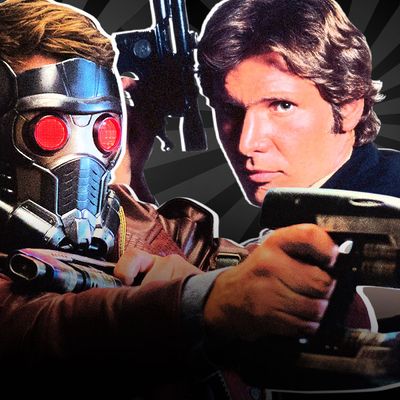
Guardians of the Galaxy may exist in the Marvel Universe, but its spiritual roots lie in a galaxy far, far away. Directed with wacko verve by James Gunn, this deliriously amusing and exciting superhero spectacle is a work that’s thoroughly indebted to Star Wars, whose influence can be felt throughout its space-Western story of outlaw misfits on a mission to save the universe. While it’s never explicitly referenced — somewhat surprisingly, given the raft of ‘70s and ‘80s pop-culture shout-outs found throughout Gunn’s rollicking adventure — George Lucas’s iconic series is evoked at almost every turn. (Particularly interesting given the fact that Disney is the umbrella under which both Marvel and Star Wars now reside.) Guardians of the Galaxy proves not only a descendent of Star Wars, but a modernized update that actually surpasses Lucas’s most recent prequel efforts. Here’s a rundown of the many commonalities between these two sci-fi sagas.
The Best of Both Heroes
Guardians of the Galaxy team leader Peter Quill (Chris Pratt), aka Star Lord, is a cocky roguish outlaw in a messy spaceship who has a wiseass quip for every dangerous situation, an eye roll to greet every threat sent his way, and some serious sexual chemistry with deadly-sexy comrade Gamora (Zoe Saldana) — in other words, he’s like Han Solo! But Quill is also a guy who left home after losing his beloved parental figure (his mom), turns out to be a born leader willing to sacrifice himself for the greater good, and is ultimately revealed [spoiler alert] to have a superbeing father whose unknown identity is established as the franchise’s core mystery going forward — all of which makes him like Luke Skywalker! It’s a two-for-one hero deal, and one that Pratt, in a star-making turn, pulls off with smirky panache.
I Find Your Lack of Faith Disturbing
The Guardians’ nemesis is Ronan (Lee Pace), a pasty-faced, black-helmeted madman intent on crushing intergalactic democracy by literally obliterating the peaceful planet of Xandar. He may not have respiratory issues, but that’s enough to make him more than slightly recall Darth Vader. It’s a connection furthered by both Ronan swiftly killing an underling who dares to criticize his behavior via a swift, magical wave of his hammer-staff (think: Vader’s force choke), and by the repeated sight of Ronan taking orders from blue-tinted hologram faces (which, it seems, makes supervillain Thanos the film’s de facto puppet-master Emperor).
Monosyllabic Sidekickery
Groot (voiced by Vin Diesel) is a towering tree-creature who says only one thing — “I am Groot” — and whose extraordinary strength is matched by his equally staunch loyalty. That makes him the team’s nominal Chewbacca member. Moreover, the fact that only his most devoted compatriot, Rocket Raccoon (voiced by Bradley Cooper), can interpret what he’s trying to convey with each “I am Groot” utterance means that Rocket also functions as a distinctly Han Solo–ish swashbuckler to Groot’s Chewy.
The Anti–Jar Jar
Guardians of the Galaxy boasts not one but two all-CG characters — Groot and Rocket Raccoon, the bounty-hunting duo with the quiet-crazy Laurel-and-Hardy dynamic. Rocket in particular is the film’s star, a creature of me-first, kill-’em-all attitude who sees Quill’s sarcastic brashness and raises it by a factor of 50. Overflowing with personality, he’s the type of computer-generated character that succeeds precisely where Jar Jar Binks failed, proving to be the adventure’s one-liner-heavy comedic relief while also retaining his intelligence, his value to the mission, and his unflappable cool. George Lucas only wishes he’d created a CG hero with a tenth of Rocket’s awesomeness.
The Narrative Alliance
Hewing closely to Star Wars’ plot outline, Guardians’ story concerns a ragtag crew of rebels fighting to save democracy (here represented by the planet of Xandar) from a planet-annihilating fascistic threat led by a superpowered dark lord. Along their journey, the Guardians also make a pit stop at a den of gambling-and-drinking iniquity (shades of Episode IV’s Mos Eisley Cantina), as well as eventually find their way to Xandar, a planet in love with the color white that, in CG panoramas, conspicuously resembles Lucas’s prequel vistas of alien metropolises.
Aerial Dogfighting
More than a few Marvel movies culminate with sky-bound battles. Yet Gunn’s fighter-jet skirmishes — including one at the story’s climax — boast a CG-ified franticness that brings to mind the various, elaborate spaceship showdowns from Lucas’s two trilogies. However, if they suggest Star Wars in their digitized aesthetics and hectic momentum, Guardians’ aerial sequences nonetheless best their predecessors in terms of clever creativity, whether it’s Quill using a small 2001-esque flying pod to literally enter and control a larger enemy jet, or a Nova Corps fleet forming an energy-beam-connected thousand-ship net to stop Ronan’s enormous craft from landing on the planet’s surface.
The Lucas Legacy
While Gunn doesn’t overly nod to Star Wars, he does make sure to give Lucas some love in a couple of other ways. First, he has Quill allude to Raiders of the Lost Ark via an offhand “Ark of the Covenant” comment — a reference underlined by the film’s intro sequence, in which Quill searches ancient ruins for a lost, valuable artifact à la Indiana Jones. And second, for those who stick around until after Guardians’ credits, he provides a cameo for another Marvel-owned character whose prior big-screen outing came courtesy of Lucas in one of the 1980s’ most fowl bombs.

